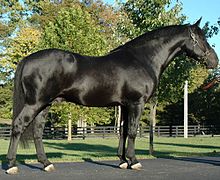Irish Hobby


The Irish Hobby is an extinct breed of horse developed in Ireland prior to the 13th Century.[1] The breed provided foundation bloodlines for several modern horse breeds, including breeds as diverse as the Connemara pony and the Irish Draught.[2] Palfreys were known as haubini in France, which eventually became hobbeye. These animals eventually found their way to Ireland where the Irish Hobby developed.[2]
The breed was mentioned in 1375 by the poet John Barbour, who called them hobynis in his poem, The Bruce. He also mentioned them in his work Reliquiae Antiquae, noting their speed.[3]
And one amang, an Iyrysch man,
Uppone his hoby swyftly ran...
Mares of Irish Hobby breeding may have been among the native horse breeds of Ireland that provided foundation stock for the Thoroughbred. There is a great deal of evidence that the Irish Hobby was imported to England and Scotland for various activities, including racing, "...they be so light and swift." [1]
This quick and agile horse was also popular for skirmishing, and was often ridden by light cavalry known as Hobelars. Hobbies were used successfully by both sides during the Wars of Scottish Independence, with Edward I of England trying to gain advantage by preventing Irish exports of the horses to Scotland. Robert Bruce employed the hobby for his guerrilla warfare and mounted raids, covering 60 to 70 miles (97 to 113 km) a day.[4]
The breed is the origin of the term hobby horse.[3]
References
- ^ a b "mtDNA in Thoroughbred Dam Lines". Retrieved 2013-05-28.
- ^ a b Valerie Porter (2002). Mason's World Dictionary of Livestock Breeds, Types, and Varieties. CABI. pp. 184–. ISBN 978-0-85199-430-7. Retrieved 28 May 2013.
- ^ a b Martin, Gary. "The meaning and origin of the expression: Hobby-horse". The Phase Finder. Retrieved 25 July 2012.
- ^ Hyland, Ann (1998),The Warhorse 1250-1600. UK: Sutton Publishing ISBN 0-7509-0746-0 p 32, 14, 37
See also
- A bit too far: Ireland's Transylvanian link in the Later Iron Age (article concerning an Irish-Dacian horsebit c. 1st/2nd-century AD), Barry Raftery, in Seanchas:Studies in Early and Medieval Irish Archaeology, History and Literature in Honour of Francis John Byrne, ed. Alfred P. Smyth, pp. 1 –11. Four Courts Press, Dublin, 2000.
